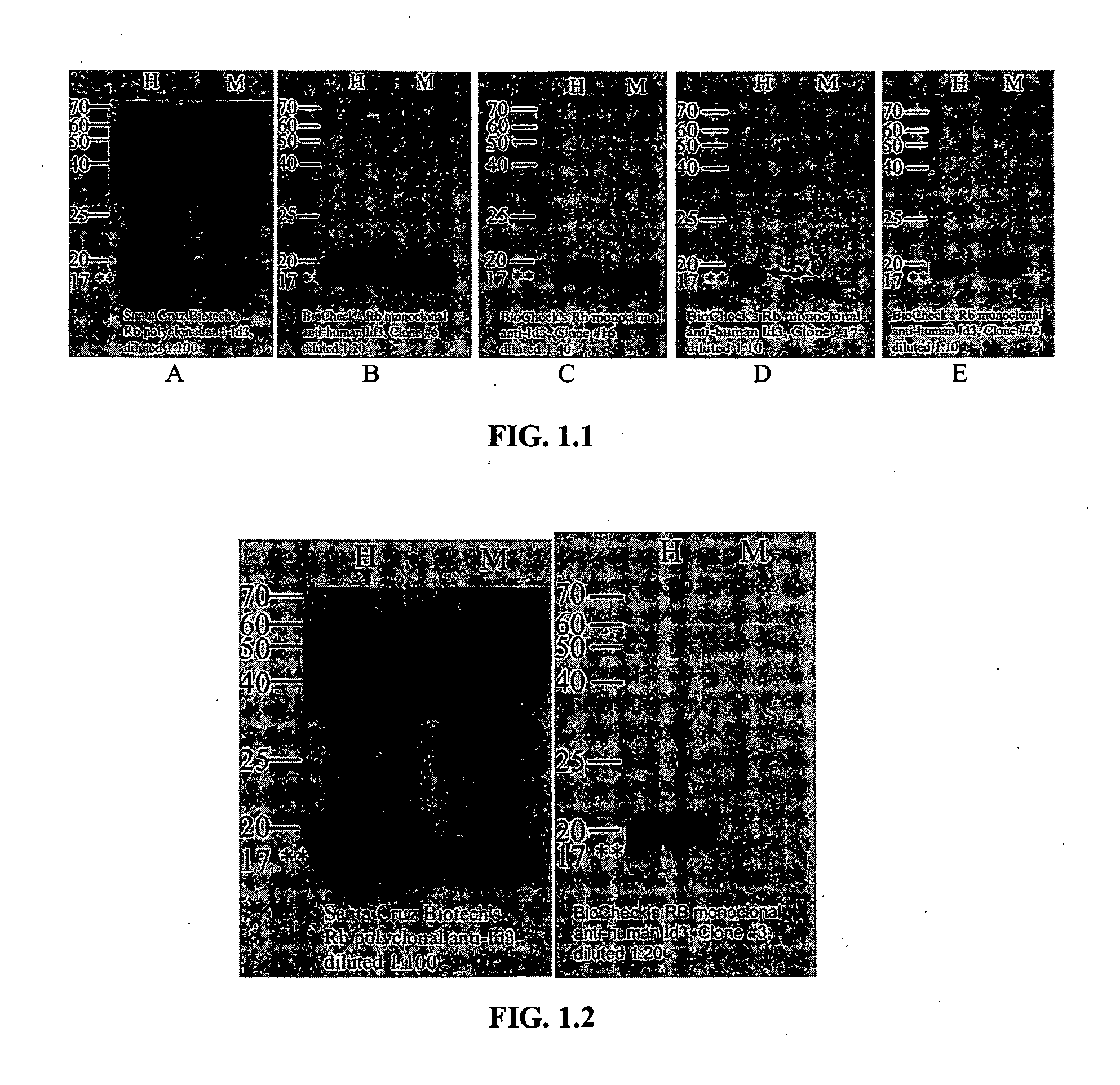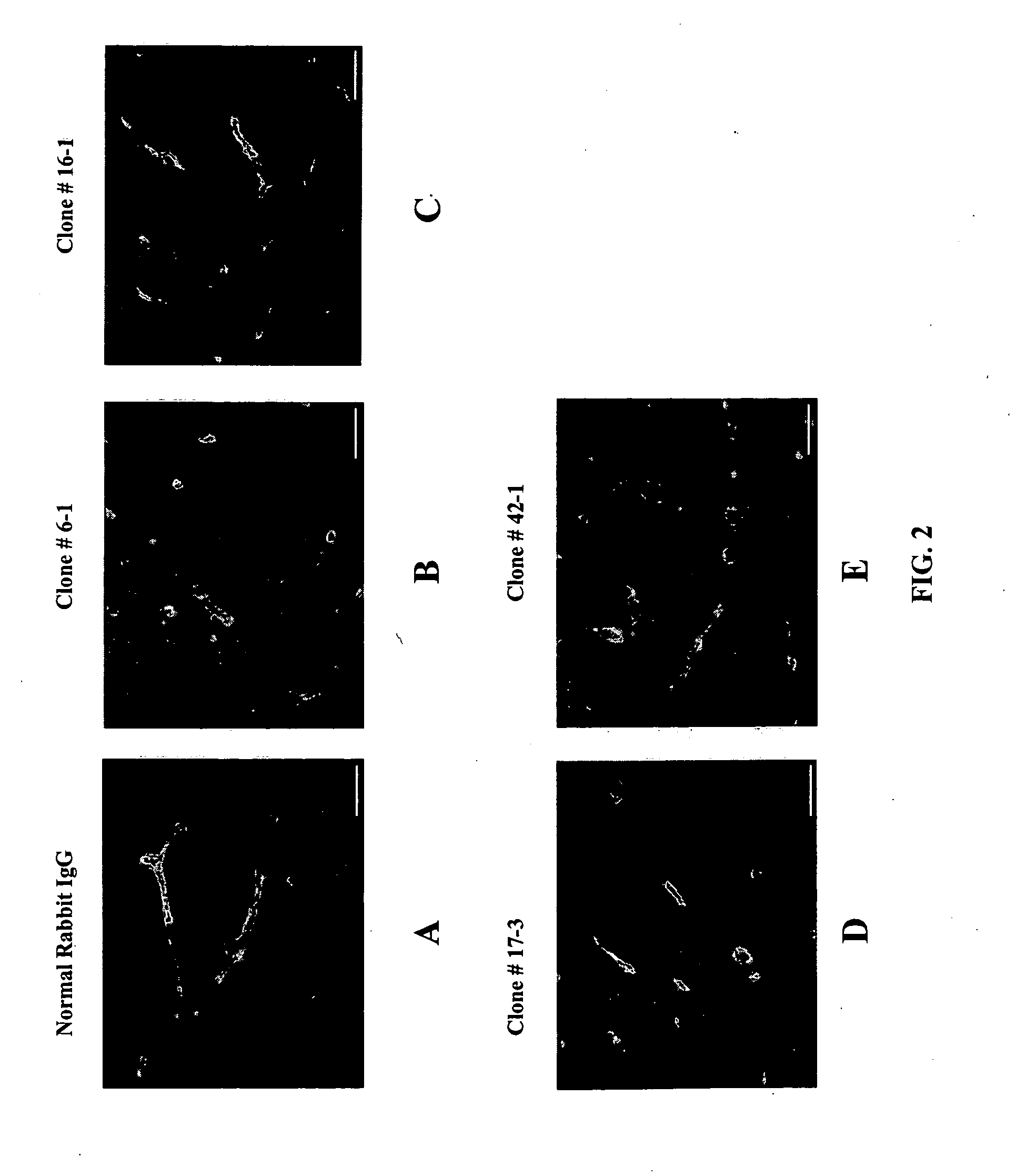Rabbit monoclonal antibodies against mouse/human Id3 proteins
- Summary
- Abstract
- Description
- Claims
- Application Information
AI Technical Summary
Benefits of technology
Problems solved by technology
Method used
Image
Examples
example 1
Preparation of Human Antigen: Transformation of E. coli Cells for Production of Cloned Human Id3
[0076]E. coli cells were transformed to produce cells capable of providing useful quantities of modified human Id3 proteins suitable for use as antigens. In one embodiment, the full length coding region gene for human Id3 (GenBank Accession No. NM-010495, 68-514 base pairs) was cloned into a pGEX-4T-3 vector (Amersham BioScience, GenBank Accession No. U13855). The pGEX vector allows for cloning the gene of interest, in this case human Id3, in frame with the GST residues (GST-tag). pGEX was treated with the appropriate restriction enzyme (EcoRI) for insertion of human Id3 gene. The resulting hId3-GST vector was used to transform BL21 strain of E. coli (Stratagene). Following Stratagene's transformation protocol, the E. coli competent cells were thawed on ice. After thawing, the cells were gently mixed and 100 μL aliquots of cells were transferred into 14-ml polypropylene round bottom tube...
example 2
Preparation of Human Antigen and Immunogen: Production and Purification of Human Id3:GST from Transformed E. coli
[0077] Human Id3 proteins useful as antigens were produced from cells of Example 1. In one embodiment for protein preparation, the auto-induction system (Novagen) in LB media was inoculated with BL21 with pGEX-4T-hId3 plasmid. The BL21 cells were grown in this system at 30° C. with shaking at 225 rpm. The BL21 cell growth was monitored by checking the optical density of the media at intervals of every 6 hours until the cells were grown to an optical density of 3. The media was then centrifuged at 5000 rpm to pellet the cells. The supernatant was discarded and the pelleted cells were lysed using B-PER lysis reagent (Pierce, Inc.). Following the manufacturer's purification protocol, the Immobilized GST Column was equilibrated with 10 mL of B-PER reagent (Pierce). 10 mL (2×5 mL) of cell lysate was applied to the column and allowed the sample to flow completely through the g...
example 4
Procedure for Producing Rabbit Polyclonal Anti-Human Id3
[0079] Rabbits were immunized as follows to produce antisera to the Human Id3:GST fusion protein prepared in Example 1 & 2. Each rabbit was initially intradermally injected to ten (10) sites with human Id3:GST prepared in Examples 1 & 2 at 1.0 mg / mL with complete adjuvant. Subsequent boost injections were injected intradermally to ten (10) sites with Id3 :GST at 0.3 mg / mL with incomplete adjuvant on days 20, 34, 47, 79, 108, 137 and 159 since initial injection. The immune-response of each rabbit was monitored via ELISA as set forth in Example 5 with human Id3:GST and GST coated micro titer wells. The rabbit antisera were diluted 1:8000 in 0.015M KPO4 buffer, pH 7.4 containing 0.25% (w / v) BSA, 0.85% (w / v) NaCl, and 0.1% (w / v) NaN3 for the ELISA tests. The rabbit with the highest anti-human Id3 antibody titer of the three rabbits was sacrificed on Day 163 after the initial injection. The antiserum obtained from this rabbit prior...
PUM
| Property | Measurement | Unit |
|---|---|---|
| Fraction | aaaaa | aaaaa |
| Fraction | aaaaa | aaaaa |
| Fraction | aaaaa | aaaaa |
Abstract
Description
Claims
Application Information
 Login to View More
Login to View More - R&D
- Intellectual Property
- Life Sciences
- Materials
- Tech Scout
- Unparalleled Data Quality
- Higher Quality Content
- 60% Fewer Hallucinations
Browse by: Latest US Patents, China's latest patents, Technical Efficacy Thesaurus, Application Domain, Technology Topic, Popular Technical Reports.
© 2025 PatSnap. All rights reserved.Legal|Privacy policy|Modern Slavery Act Transparency Statement|Sitemap|About US| Contact US: help@patsnap.com



